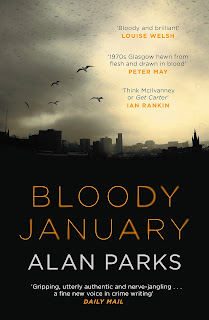Bloody January – Alan Parks
The nature of the characters that inhabit this moral wasteland and the situation that they find themselves in is also one familiar to fans of classic noir, but this is no pastiche; if it feels noir, then it’s the nature of the subject and Alan Parks’ debut is very much rooted in the its own time and place. In such an environment our lead detective Harry McCoy would of course be a heavy drinker, would be familiar with and no doubt sampled the wares of the city’s drug, crime and prostitution rings, and be on speaking terms with the people who operate them. If he didn’t partake of what these places had to offer, he’d hardly be of much use as a police officer trying to keep a lid on anything bigger blowing up.
Blowing up however is exactly what happens in the particularly miserable January of 1973. Despite a tip-off from an influential inmate in one of the prisons, Harry McCoy is unable to prevent a young woman being shot in broad daylight at a bus station, nor is he able to prevent the killer taking his own life, leaving the force with a mystery. A subsequent autopsy reveals some worrying signs of bruising on the woman’s body, and it’s not long before another dead woman turns up in a similar state of abuse.
Other noir tropes are very much in evidence. McCoy has a habit of getting beat-up by thugs in dark alleys, he gets to sleep with some femmes fatales. His ex-wife Angela is now married to the right-hand man of the rich and influential shipyard owning Dunlop family, and there’s a lot of painful history there. The Dunlops inevitably have some very exotic tastes and a wayward son who likes to indulge them to a dangerous degree. With the decline of the shipyards, the Dunlops are looking to expand into new ventures of dubious legality, but their activities – and the nature of corruption rife within the police force – make them just as untouchable as the criminal gang lords.
Parks certainly evokes the period and the setting well, unflinching in language and situation that reflects the brutal reality on the streets, but Is there a meaningful underlying purpose to all this noir styling and the use of the 1970s? Well, Glasgow in the age of Glam rock is certainly one way of highlighting the divisions between rich and poor by contrasting surface glamour with the underlying reality. David Bowie even makes a cameo appearance in Ziggy Stardust guise in the novel, but it’s not gratuitous, delving into the seedy backstage activities. Similarly, in Glasgow, some rich families are keen to present a respectable image that hides something much uglier; while the ordinary people are caught in a web of exploitation, the streets reeking of poverty, unemployment and down-and-outs, living in hovels and getting drawn into a network of drinking, drugs and prostitution.
As the backstage goings-on at the Bowie concert also indicate, there’s another reason for the choice of the 1970s setting, and it’s definitely not nostalgia. Or maybe it is nostalgia as far as McCoy is concerned, for as bad as crime is in Glasgow in 1973, it’s about to get much worse. Heroin is starting to make its appearance on the streets, and with will come greater gang violence over supply and distribution, breeding a more dangerous type of criminal, and it will be the more vulnerable elements of society that will pay the price. This is an impressive debut by Alan Parks, a 70s’ noir drenched in atmosphere and character detail, with a very real and black theme at its heart.




Comments
Post a Comment